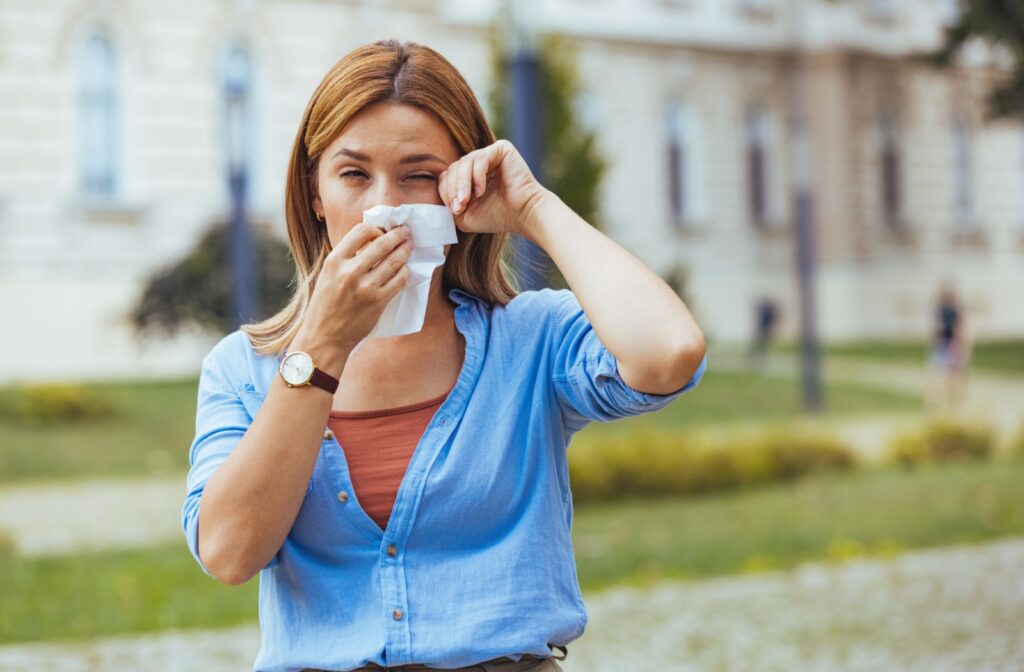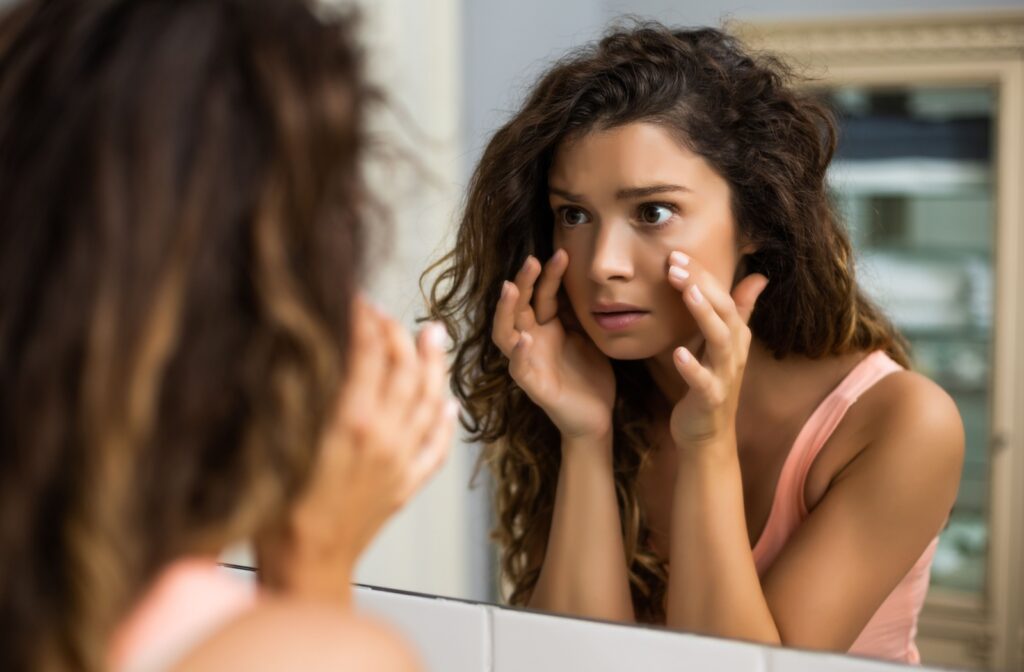Waking up with dry, irritated eyes can be an uncomfortable and frustrating way to start your day.
Dry eye occurs when your eyes don’t produce enough quality tears to keep the surface properly lubricated. This lack of moisture can lead to symptoms like redness, irritation, blurred vision, and even eye fatigue, especially noticeable in the morning.
But what’s behind this discomfort? And how can you avoid dry eyes in the morning? There are several common reasons you might be waking up with dry eyes, including:
- Environmental factors such as dry air or air conditioning
- Allergies that trigger inflammation overnight
- Nocturnal lagophthalmos, a condition where your eyes don’t fully close during sleep
- Behavioral habits like screen time or contact lens use before bed
- Medications and health conditions that affect tear production
What Are Dry Eyes?
Dry eye occurs when your eyes can’t produce enough quality tears to keep your eyes lubricated. Tears play a vital role in eye health, not just for keeping your eyes moist but also for protecting them from irritation, infections, and debris.
If your eyes aren’t getting the moisture they need, you may experience symptoms like redness, irritation, blurred vision, and fatigue. These symptoms can be especially pronounced in the morning, leaving you feeling frustrated before your day even begins.
With that context in mind, here’s why you might keep waking up with dry eyes:
1. Environmental Factors
Your sleeping environment might be the culprit behind your dry eyes. Adverse air conditions—such as low humidity, poor air circulation, and artificial airflow from air conditioners, fans, or heaters—can dry out the air and speed up the evaporation of your tears.
Prolonged exposure to these environments at night prevents your eyes from fully retaining moisture while you sleep, leading to dry, uncomfortable eyes the moment you wake.
Solutions
- Use a humidifier in your bedroom to maintain optimal moisture levels in the air.
- Avoid placing fans or heaters directly toward your face as you sleep. Make adjustments to create an eye-friendly sleeping environment.
2. Allergies

Allergens like dust mites, pet dander, or remnants of skincare products can irritate your eyes during sleep, causing inflammation that leads to dryness. Even if you don’t have allergies during the day, nighttime exposure to these irritants can trigger morning dry eyes.
Solutions
- Wash your bedding frequently to minimize allergens.
- Remove all makeup and cleanse your face thoroughly before bed.
- Consider using anti-allergy pillowcases or hypoallergenic products if allergens are a frequent issue.
3. Nocturnal Lagophthalmos
Nocturnal lagophthalmos is a condition where your eyelids don’t fully close while you sleep. This partial closure allows moisture to evaporate from the surface of your eyes, leaving them dry and irritated when you wake.
People with this condition often aren’t aware they have it, but it’s a common cause of dry eyes in the morning.
Solutions
- Speak to an optometrist who can perform a proper evaluation.
- Treatments like specialized eye masks or lubricating ointments that coat your eyes overnight can be helpful in managing this condition.
4. Behavioral Habits
Your daily habits may play a bigger role than you realize. Staring at digital screens before bedtime, wearing contact lenses late into the night, or even not blinking often enough during the day can all dry out your eyes. These habits can strain your tear film and leave your eyes struggling to stay lubricated by morning.
Solutions
- Follow the 20-20-20 rule if you’re regularly using screens. Every 20 minutes, look at something 20 feet away for 20 seconds.
- Avoid prolonged contact lens wear and follow care instructions closely. Switching to glasses in the evening can help.
- Optimize your nightly routine by limiting screen time at least an hour before bed and focusing on eye care.
5. Medications & Health Conditions
Certain underlying health conditions or medications can also reduce tear production or change the quality of your tears. Common culprits include antihistamines, antidepressants, high blood pressure medications, or conditions like autoimmune diseases and hormonal imbalances.
If you’re managing health issues or taking prescribed medications, these might be contributing factors to your morning dry eyes.
Solutions
- Discuss your symptoms with your eye doctor. They can assess whether your medication or an underlying condition might be involved.
- For some people, treatments like artificial tears, prescription eye drops, or other therapies might help restore moisture.
Caring for Dry Eyes
Addressing morning dry eyes isn’t just about temporary relief; it’s about improving your overall eye health and quality of life. Here are some additional steps to consider for managing this condition effectively:
Make Lifestyle Changes
- Prioritize eye hygiene by cleaning your eyelids and lashes before bed.
- Create an environment that minimizes exposure to irritants, allergens, or harsh airflow.
Rehydrate Your Eyes
- Use doctor-recommended preservative-free artificial tear drops.
- For more persistent symptoms, we may recommend in-office treatments like prescription drops, radiofrequency treatment, ZEST treatment, punctal plugs, or other treatments.
Seek Professional Help
If morning eye discomfort is persistent, noticeable, or worsening, don’t wait to seek professional care. Your eye doctor can perform an exam to pinpoint the causes of your dry eyes and create a personalized treatment plan to help you wake up more comfortably.
Start Your Morning Right
Morning dry eyes can be frustrating, but they don’t have to set the tone for your whole day. By identifying the root causes and implementing targeted solutions, you can enjoy more comfortable mornings and healthier eyes. At Eye Lab, we offer in-office treatments, home therapy, prescription medications, and nutritional supplements as part of our comprehensive and customized treatment plan. We even provide a 12-month dry eye monitoring program to help prevent you from experiencing flare-ups. So if you’ve been struggling with dry eyes, book an appointment with our team and take the first step toward clearer, more comfortable mornings.





